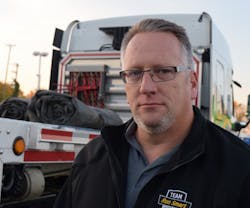Joey Slaughter doesn't want to sound harsh when talking about his fellow drivers, but sometimes he gets frustrated by their appearance and how they act. "I don’t want you to think I'm being high and mighty, but some of this stuff angers me, the way many drivers are."
The owner-operator, a member of Team Run Smart, wants drivers to act professionally, because it reflects on all drivers and affects how they're treated by customers, their companies and the public.
Slaughter, who owns Virginia-based carrier Blue Ridge Transport, LLC, has been driving since 1992. He started the company in 2010 after serving time as an unhappy employee with a local trucking company. Slaughter notes that the time spent there was not pleasant, but it served as a turning point that propelled him into the world of being an entrepreneur. His company specializes in nationwide step deck transportation and clients include the U.S. Military, independent equipment dealers, manufacturers of building products, state government and local municipalities.
He suggests ten things drivers can do to be more professional.
- Arrive on time: "The other day, I saw a driver arrive at a shipper six hours early. He was surprised when they told him to leave. Being on time also means not being too early. A lot of companies don't have room or resources to accommodate early pick-ups. They may not have space for an early truck. They're on a schedule, too."
- Watch your hygiene: Slaughter is well aware that drivers may be all alone for many hours, not seeing another person, but that's no excuse for poor hygiene. "I go to these truck stops at night and they’ll be full – 200 or 300 trucks in the lot - and the showers are wide open. There’s hardly anyone using them, and I have to think not everyone’s taking care of personal hygiene. It's s a rough life out here, I know that, but there are ample enough services out here for us."
- Wear clean clothes: "Someone can tell if you just got grease on your shirt or if it’s a shirt you've been wearing for three days. I have a very physical job. I'm pulling a step-back, a lot of heavy equipment, a lot of tarping, a lot of physical labor. I used to haul cars, and that’s even worse. Sometimes I would get nasty just getting everything loaded and secured. Then I went back in the office and I would change shirts. I was ashamed of how I looked at times so I took care of it." He adds, "I always wear a collared shirt."
- Wear appropriate footwear: "I was at Fort Bragg a month or so ago and there was a guy securing heavy equipment with flip-flops on. He was throwing chains, and he almost landed one on his foot. I couldn’t believe he was dressed like that - shorts, a tank top, and flip-flops. You have to wear the right clothes for the job. It's not just a matter of appearance but also of safety. I see people walking around the fuel island in flip-flops and there's diesel all over the ground."
- Smile: "Before you speak a word to anyone, let them see a smile on your face." Slaughter admits this many not be easy for some drivers. "No one really wants to admit that this job attracts a certain kind of person, and I'm one of them I guess. We’re independent. We’re kind of quiet people too; we don’t say a whole lot, or naturally smile. I try to put a smile on my face, because people who deal with truck drivers all the time… well… I kind of feel sorry for them. Drivers can be a tough bunch to work with… the waitresses at the truck stops, the people at the fuel desk … "
- Use proper grammar: "People judge us by first impressions. Make good eye contact, too."
- Introduce yourself: "I tell them my name and my company. 'I'm Joey Slaughter with Blue Ridge Transport Delivery.' When we meet someone properly, we treat one another better."
- People like to be called by their name: "I'm that way. I think most people are. I've learned that once I've talked to someone and get their name, and I call them by their name, then I'm actually treated better. Everyone wants to be treated with respect, and you have to give it first."
- Don't wear your Bluetooth headset: "It's not very professional looking. Most truckers use the over-the-head ones that make you look like an airline pilot. I see people walking around shippers and receivers wearing that thing, and it looks unprofessional. They’ll be carrying on conversations, handing off paperwork. Put it away."
- Do what you say you're going to do: "My wife and I joke about it… when someone actually does something that they say, we're surprised nowadays. I think we need to make it the rule instead of the exception."
Slaughter realizes that many of these suggestions sound like they're aimed at someone who's new to the workforce, not just truckers. He notes that trucking attracts some less than professional people because it's an easy career to enter with no education or experience requirements beyond driver training. He tells of a 50-year old, educated man he recently met who decided he wanted to drive a truck. "He wasn't your average Joe coming into the industry, and he was astounded at how they would treat him and talk to him." He wasn't used to being treated in such an uncivil manner. Everyone, not just drivers, needs to act more professionally, he says.
About the Author

Larry Kahaner
Larry Kahaner is an author, journalist, and former FleetOwner contributor.
